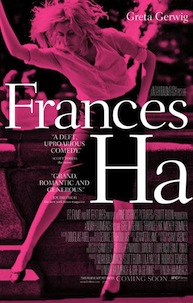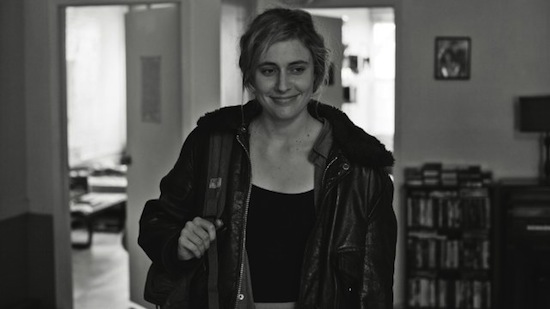
| Release Date: | May 24th, 2013 |
| Starring: | Greta Gerwig, Adam Driver, Grace Gummer, Mickey Sumner, Patrick Heusinger, Michael Segen |
| Writer: | Noah Baumbach, Greta Gerwig |
| MPAA Rating: | PG-13 |
| Director: | Noah Baumbach |
Comparisons to vintage Woody Allen have buzzed around Noah Baumbach’s dramatic comedy Frances Ha since it premiered at last year’s Toronto International Film Festival; mostly due to the fact that it is shot intimately in soft-grey-and-white and features a dawn-watching romantic score that owes a greater debt to some French film critics than to Mr. Allen’s more formalistic style.

HBO’s stellar series Girls has already laid out an unpaid intern’s broad spreadsheet detailing how tough it is to eek-out a brownstone-burrough kinda lifestyle – with it’s intimate, awkward portrayals of sexuality and a witty candor borrowed from the kind of micro-budget “mumblecore” movies that Gerwig made somewhat watchable when she emerged as that scene’s figurehead. Thankfully, with Frances Ha, we are in the hands of a seasoned director with a track record of literate, highly-praised work (The Squid and the Whale, Greenberg, Margot at the Wedding) using some of the bedroom-shooting quietness of mumblecore, but also opening the movie up to follow Frances around a dusky, romantic New York of movie-world fantasy, plus episodic detours to California and a Paris, France that feels as mundane as upstate New York (the City of Light and Romance dimly-filtered through Frances’ narcissistic pre-occupations with her lack of romance and a steady job).
[springboard type=”video” id=”726203″ player=”cnim002″ width=”560″ height=”315″ ]
Self-defined as “not a real person yet,” Frances wins us over by remaining almost obsequiously chatty, especially around those more “grown-up” and successful than she – creating comedy out of her social eagerness and endearing effort to relate to everyone. Though I found the twee, eloquent, Ivy League comedy stylings of Baumbach and Gerwig to be smile-worthy for most of the film’s running-time, it will surely polarize those who balk at self-absorbed, confessional modes of humor. Frances is not entirely sympathetic, but always real and relatable; we root for her dream of making it into a full-time ballet company (and bucking a trend, not as much for her to find a steady guy) basking in the optimistic, plucky final scenes which left me with a contented feeling.

Greta Gerwig in “Frances Ha.”
Peppering tastefully cool pop music choices with helpings of 1960s nouvelle vague composer George Delerues string-heavy scores identifies Frances Ha as a film enchanted with that movement’s concerns about youthful vitality, philosophical discourse, and a Hollywood-coded version of “real” people in interesting circumstances. A cut-throat American metropolis in the year 2013 would not seem to be comparable with 1960s Paris, but by cutting out the real NYC’s background overpopulation and too many modern distractions, Baumbach zeroes in on the eternal struggle of youth and self-definition that make Frances Ha a wise, amusing, and casual variation on that era’s artistic approach and deathless themes – but here his onomatopoeic heroine gets the last laugh (there’s an “a-ha” moment explaining the movie’s title) denied to many of her fatalistic French counterparts.[box_info]WHERE TO WATCH (powered by JustWatch)
[/box_info]

